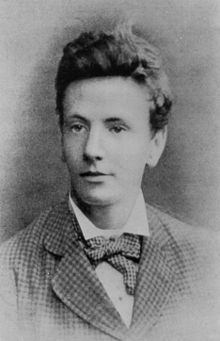William Sutherland (physicist)
| William Sutherland | |
|---|---|

Sutherland in his twentieth year
|
William Sutherland (24 August 1859 – 5 October 1911) was a Scottish-born Australian theoretical physicist, physical chemist and writer for The Age (Melbourne) newspaper.
Sutherland was born in Glasgow, Scotland, son of George Sutherland, a woodcarver, and his wife Jane, née Smith. William had siblings Alexander Sutherland, George Sutherland and Jane Sutherland. The family emigrated to Australia in 1864, staying in Sydney for six years and then moving to Melbourne in 1870. Sutherland later graduated from Wesley College. The headmaster was Martin Howy Irving who had been the second professor of classics at the University of Melbourne, but the influence of the second master, H. M. Andrew, afterwards professor of natural philosophy at the same university, was of more importance to Sutherland. From Wesley Sutherland enrolled at the University of Melbourne in February 1876, graduating B.A. in 1879 with first-class final honours and the scholarship in natural science, and third-class honours in engineering.
Sutherland was then nominated by the Melbourne University council for the Gilchrist scholarship at University College, London, in England, which was awarded to him and he left for England in July 1879. Entering as a science student at University College London, Sutherland came under the influence of Professor Carey Foster, and in the final examination for the BSc degree took first place and first class honours in experimental physics and the clothworkers scholarship of £50 for two years. Sutherland had not enjoyed his time in England and arrived back in Melbourne in February 1882.
Sutherland's home life meant a lot to him, it was a home of affection and culture, every member of it excelled in either literature, music or art. In July 1882 Sutherland was offered the position of superintendent of the School of Mines, Ballarat, but it was too far from his home and the public library, and the offer was declined. For many years he earned just enough to pay his way by acting as an examiner and contributing articles to the press; the rest of his time was given to scientific research. In 1884 he applied without success for the chair of chemistry at the University of Adelaide, and in 1888 when the professor of natural philosophy Henry Martyn Andrew died Sutherland was appointed lecturer at the University of Melbourne until the chair could be filled. Sutherland had applied for this position through the Victorian agent-general in London, but the application was reportedly mis-filed and was not considered. Professor Thomas Ranken Lyle was appointed and in 1897, when he was away on leave, Sutherland was again made lecturer. Sutherland had begun contributing to the Philosophical Magazine in 1885, and on an average about two articles a year front his pen appeared in it for the next 25 years. For the last 10 years of his life he was a regular contributor and leader writer on the Melbourne Age, particularly on scientific subjects. Sutherland declined an offer of an appointment on the staff of the paper. Sutherland wrote on such topics as the surface tension of liquids, diffusion, the rigidity of solids, the properties of solutions (including an influential analysis of the structure of water), the origin of spectra and the source of the Earth's magnetic field. Sutherland devoted most of his time to scientific research. A list of 69 of his contributions to scientific magazines appears in W. A. Osborne's, William Sutherland a Biography. Sutherland died quietly in his sleep on 5 October 1911 from a ruptured heart.
...
Wikipedia
